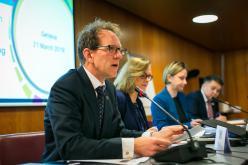The first Regional Consultation on the Plan of Action to Integrate Volunteering into the 2030 Agenda in the UNECE region took place in Geneva, Switzerland, on 21 March 2019. The consultation was organized in the context of the Regional Forum on Sustainable Development, as mandated by UN General Assembly Resolution A/RES/73/140, and provided a space for Plan of Action stakeholders from the UNECE region to identify opportunities to support volunteers and accelerate SDG progress while tackling the region’s most pressing issues.
Monika Linn, Principal Adviser of the United Nations Economic Commission for Europe, Jason Pronyk, Regional Manager of the UN Volunteers (UNV) programme in the Arab States, Europe and countries of the Commonwealth of Independent States, and Professor Cécile Aptel, Director of Policy, Strategy and Knowledge Department at International Federation of Red Cross and Red Crescent Societies (IFRC), delivered opening remarks and invited participants to share innovations and best practices, discuss opportunities for new partnerships and approaches, and analyse ways to overcome common challenges. Yerlik Karazhan, Chairman of The Board at the JSC Economic Research Institute, Ministry of National Economy, Republic of Kazakhstan, served as a Chair of the Regional Consultation.

Emma Morley, Chief of Volunteer Advisory Services at the UNV programme, shared findings from a regional synthesis report. Antoine Tardy/UNV 2019.
Emma Morley, Chief of Volunteer Advisory Services at the UNV programme, shared findings from a regional synthesis report that drew on information submitted by UNECE Member States on the scale, scope and impact of volunteerism across the region. Narmin Aslanbayova, Head of Social Programs Department Ministry of Youth and Sports, Republic of Azerbaijan, and Anne-Sophie Jouanneau, Head of Volunteering Unit, Directorate General of Globalization at Ministry of Europe and Foreign Affairs of France, focused on the current trends, challenges and best practices of volunteering in the UNECE region.
UNV estimates there are at least 45 million full-time equivalent volunteers in the UNECE region. To harness this resource effectively, we must mainstream volunteering into national development strategies, sector strategies and incorporate it into national SDG roadmaps -- Emma Morley, Plan of Action Secretariat, Chief of Volunteer Advisory Services at the UNV programme

Artem Metelev, Chairman of Association of Volunteer Centres of the Russian Federation, presented best practices and challenges of volunteering in Russia. Antoine Tardy/UNV 2019
In the second part of the event, Artem Metelev, Chairman of Association of Volunteer Centres of the Russian Federation, Vladimir Ganta, Senior Statistician, Statistics Department at International Labour Organization, Emrah Tek, Chief of the Youth and Volunteer Directorate at the Turkish Red Crescent Society, and Bogdanka Tasev Perinovic, Roma Inclusion Project Manager at the United Nations Development Programme in Serbia, addressed solutions to the challenges that were identified in the regional synthesis report and the first session and provided further evidence through questions from the moderator and audience. The session was moderated by Amjad Saleem, Manager of Inclusion, Protection and Engagement department at the IFRC.

Anne-Sophie Jouanneau, Head of Volunteering Unit, Directorate General of Globalization at the Ministry of Europe and Foreign Affairs of France, presented current trends of volunteering in France. Antoine Tardy/UNV 2019
Volunteers can be powerful and cross cutting SDG accelerators. But volunteers cannot act alone. They need our support and all UNECE Member States should work through the Plan of Action to integrate volunteering into Agenda 2030 and gather further evidence to enhance, recognize and advocate for volunteering. Taking these actions will help ensure that people’s agency and ownership are embedded into the SDGs and that the 2030 Agenda is implemented by all people, for all people. -- Yerlik Karazhan, Chairman Of The Board at the Economic Research Institute, Kazakhstan, and a Chair of the Regional Consultation
The outcomes of the discussion that took place during the Regional Consultation can be presented by three main reflections. First, volunteers can be a powerful SDG accelerator but only if they are fully integrated into national frameworks. UNECE countries are advised to mainstream volunteering into national development strategies, sector strategies and incorporate it into national SDG roadmaps. Second, volunteering can empower and transform lives, including those of the most marginalised. However, women volunteers can be stigmatized, local volunteers exploited, and volunteers with disabilities excluded. Participants of the Consultation agreed that UNECE Member States need to commit to engage the furthest behind first and create equal volunteering opportunities for all. And third, more evidence is required to measure the impact of volunteers against the SDGs. National statistical offices should collect more data on volunteers, including disaggregated data, and UN Member States need to recognize the enormous contributions of volunteers, including in the Voluntary National Reviews.
These reflections and recommendations were presented at the closing session of the Regional Forum on Sustainable Development and will feed into further dialogues on the Plan of Action, as well inform a global synthesis report for a Global Technical Meeting to be held at the 2020 High Level Political Forum and co-chaired by the IFRC and Red Crescent Societies and the UNV programme.

